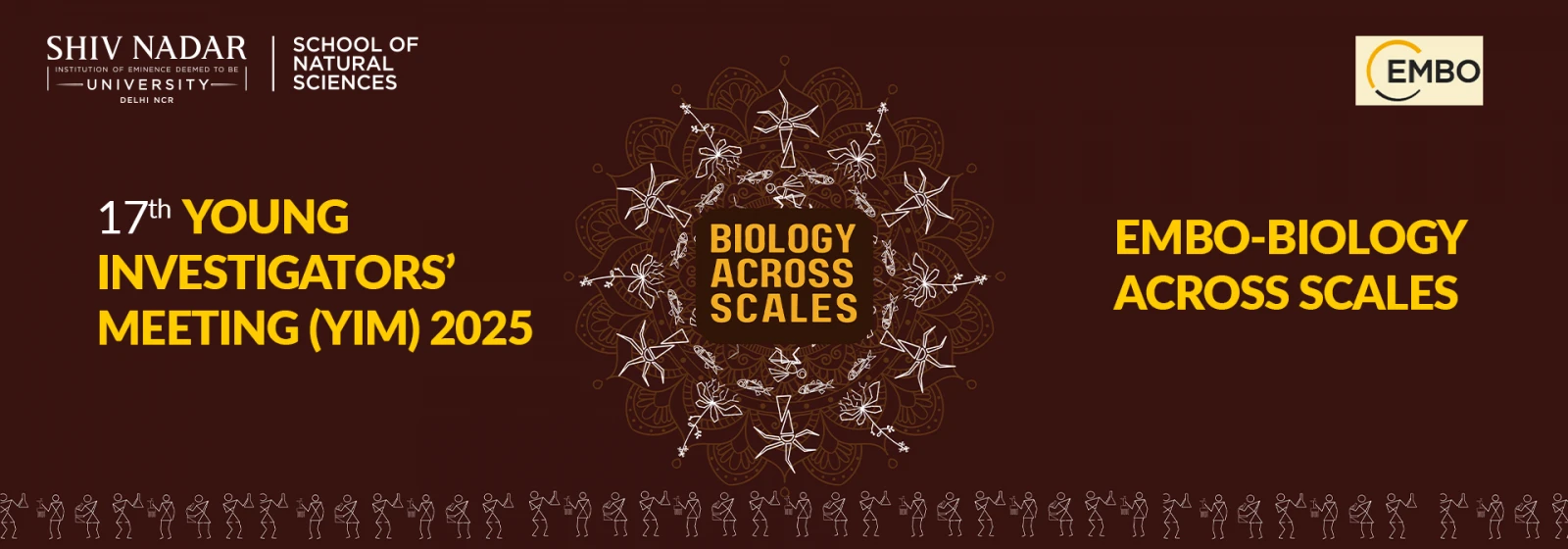Influencing Incipient Researchers: How Community and Institutional Events are Shaping the Life Sciences in India

YIM 2025: Preparing the Pioneers of Tomorrow
Organised by India Bioscience and co-supported by Shiv Nadar Institution of Eminence (SNIoE) and the Department of Biotechnology (DBT), Government of India, YIM 2025 marked a unique opportunity for the outstanding young investigators in the Indian life sciences to access mentorship, expand their networks, and bolster their career opportunities.
YIMs have long been recognized for bringing together mentors and speakers from government, academia, and industry, and this year was no exception. The event kicked off with a keynote address by Rajesh Gokhale, Secretary of DBT, offering participants valuable insights into the current landscape and vast scope of life sciences research in India.
The core objective of YIM is to equip participants with the skills needed to lead their own labs and push the boundaries of scientific discovery. With this in mind, the conference addressed practical aspects such as career challenges, funding opportunities, strategic budgeting, and essential academic activities necessary for managing a research group.
Acknowledging the evolving nature of academia, the event also featured discussions on critical topics like open access and open science, AI in research, technology incubators, and more. YIM 2025 further explored key scientific challenges in life sciences through thought-provoking talks on subjects such as the zebrafish model for translational research, limitations of conventional animal models, the intersection of evolution and microbiology, biomarker technologies, and super-resolution imaging.
What makes YIM unique among life science conferences is its dedicated satellite meeting for postdoctoral fellows (PDFs), aimed at introducing them to India's leading research institutions, funding avenues, and potential collaborators. This year’s PDFs showcased groundbreaking research on topics such as denitrifying microbial fuel cells, innovative biologics for ovarian cancer, bioprospecting, phytoremediation, and cost-effective medical electrode fabrication, among many others. Importantly, YIM also serves as a vital platform for returning scholars to reconnect and rebuild their professional networks within India.
Directing Student Interest Using a Synoptic Overview with EMBO–Biology Across Scales

The artwork for EMBO–Biology Across Scales symbolises the fusion of Indian heritage with global scientific collaboration. Designed by Arnav Ghugal and Prisha Bhatia, undergraduate students in Biotechnology from SNIoE, the artwork showcases the Warli art style.
As a continuation of YIM 2025, the Department of Life Sciences at SNIoE, in collaboration with the European Molecular Biology Organization (EMBO), organized Biology Across Scales—a day-long symposium for college students across the Delhi-NCR region on March 8. The event was driven by a vision to equip undergraduate and graduate students in the life sciences with the knowledge needed to make informed choices about their specializations. True to its name, the symposium covered a broad spectrum of research topics, ranging from sub-microscopic dynamics like vesicular transport to microscopic interactions such as host-pathogen relationships, and even macroscopic perspectives in evolutionary biology.
Students had the opportunity to attend talks by renowned experts in the life sciences. Prof. Koichi Kawakami from the National Institute of Genetics, Japan, delivered an inspiring lecture on the use of ‘jumping genes’ (transposons) to study neural circuits. Prof. Carl-Philipp Heisenberg from the Institute of Science and Technology, Austria, explored embryonic development in zebrafish, highlighting how asymmetric cell division impacts cell cycles and early genome activation. Other invited speakers covered a wide range of cutting-edge topics, including dynein motors in vesicle transport, neuron–cancer cell–immune cell interactions, lipid turnover in host-pathogen interactions, the intersection of evolution and microbiology, and microbial insights into carnivorous plants.
Additionally, postdoctoral fellows (PDFs) from YIM had the chance to reprise their lightning talks, offering participants rapid insights into diverse research areas such as immunology, cancer biology, and plant metabolism.
A standout feature of the event was the interactive poster presentation, where students, Ph.D. scholars, and PDFs from around the world showcased their research. This session provided a platform for emerging life science researchers to share their interests, engage in discussions, and receive valuable feedback on their work.
Initiatives like Biology Across Scales help bridge a crucial gap in the research ecosystem by fostering a strong pipeline from college classrooms to cutting-edge laboratories, shaping the future of life sciences research.
